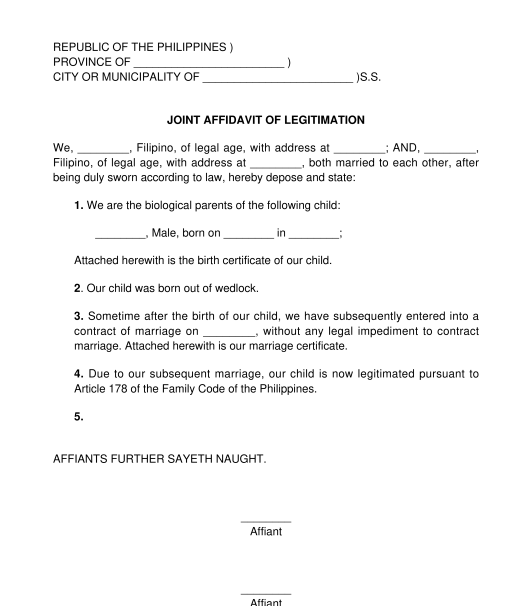 10/21/2025
10/21/2025

Answer a few questions and your document is created automatically.

Your document is ready! You will receive it in Word and PDF formats. You will be able to modify it.

 10/21/2025
10/21/2025
 Word and PDF
Word and PDF
 1 page
1 page
An Affidavit of Legitimation is a document that may be used by a biological parent (the affiant) to prove that his or her child(ren) has been legitimated by a subsequent valid marriage between him and the other biological parent after the birth. This affidavit can also be used jointly by the biological parents of the child(ren) to prove that they have been legitimated by a subsequent marriage between said parents.
The purpose of an Affidavit of Legitimation is to prove that a child has been legitimated and to update the child's records in various government offices such as the Office of the Civil Registrar.
Process of Legitimation
Legitimation is a legal process whereby the child's status becomes that of a legitimate child, meaning he will be able to enjoy the rights of a legitimate child such as full inheritance rights, the right to use the surname of his father, and the right to full parental guidance and custody from his biological parents by reason of their subsequent valid marriage.
Illegitimate vs. Legitimate child
A child who is born out of wedlock is considered an illegitimate child but becomes legitimated upon the subsequent valid marriage between the child's parents after the child's birth. Contrarily, a child who is born while his parents are married is considered a legitimate child. It must be noted that an illegitimate child does not have full inheritance rights, the right to use the surname of his father, and the right to full parental guidance and custody from both of his biological parents while a legitimate or legitimated child has these rights.
Biological parentage means the parents have not impugned or questioned their child's filiation (i.e. via a DNA test result). If the child is born while the parents are married, the child is presumed to be their legitimate and biological child. On the other hand, if the child is born out of wedlock and the parents subsequently marry, the child is presumed to be their legitimated biological child.
It must be noted that if the biological parents are not married, even if the child uses his father's surname, he still is considered to be illegitimate under the law although considered a biological child.
Subsequent Valid Marriage
The subsequent marriage must not have any legal impediments and must take place after the birth of the child for the legitimation to be valid. The requirement of the absence of legal impediment means that:
An Affidavit of Legitimation contains the following information:
The necessary attachments to this affidavit include the birth certificate of the legitimated child(ren) as well as the marriage certificate between the affiant and his spouse.
After completing the affidavit, at least two copies must be printed. Then both copies must be presented and signed in front of a notary public for notarization. One copy will be given to the notary public, and the other will be kept by the affiant and may be used for its intended purpose.
An Affidavit of Legitimation is governed by the Family Code of the Philippines. Further, affidavits are governed by the 2004 Rules on Notarial Practice. It should also be noted that making untruthful statements in a notarized affidavit may be punishable under the Revised Penal Code of the Philippines.
You fill out a form. The document is created before your eyes as you respond to the questions.
At the end, you receive it in Word and PDF formats. You can modify it and reuse it.
A guide to help you: What is an Affidavit?
Affidavit of Legitimation - sample template
Country: Philippines